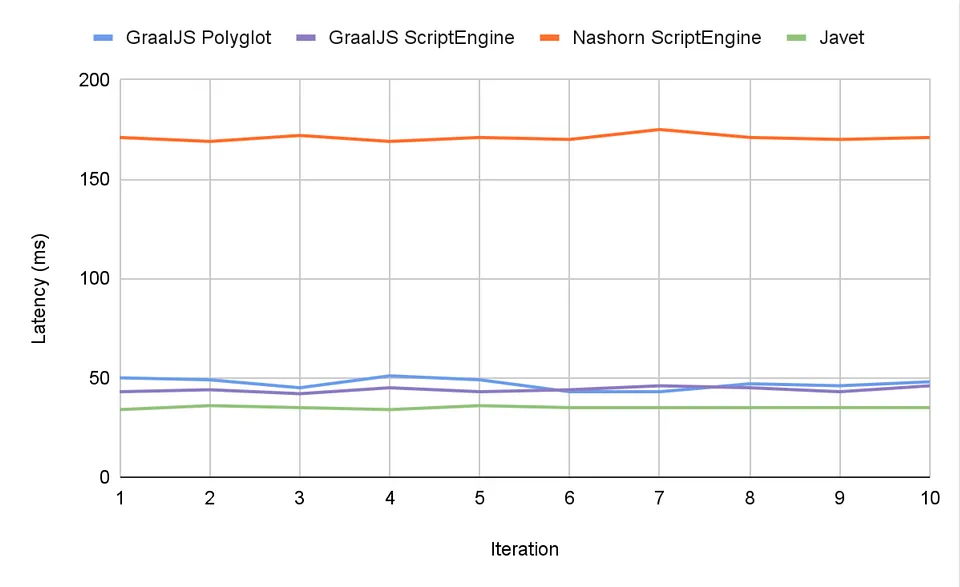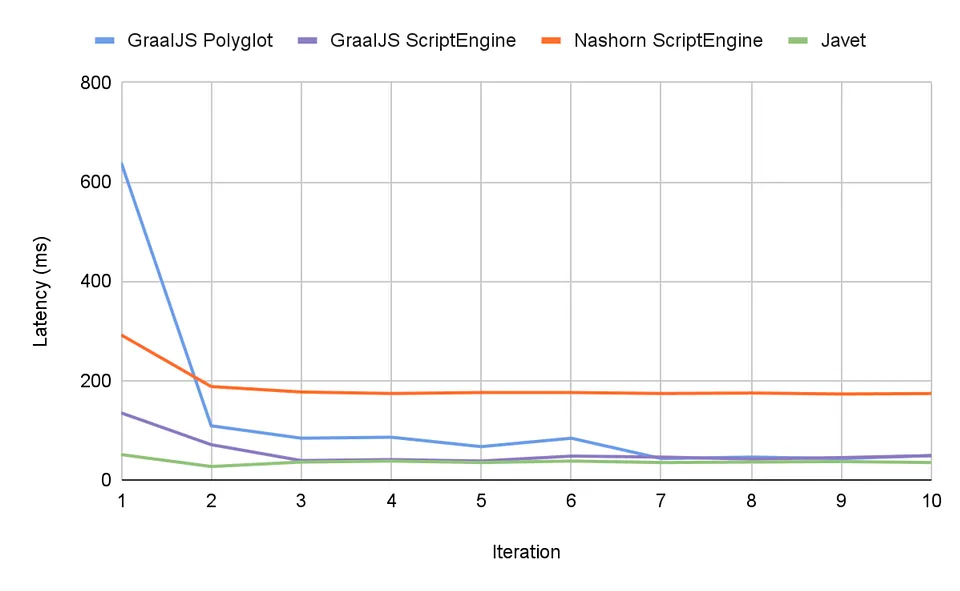A simple performance comparison of GraalJS, Javet and Nashorn.
Javet is Java + V8 (JAVa + V + EighT). It is an awesome way of embedding Node.js and V8 in Java.
Many potential Javet users evaluate Javet and GraalJS, across many aspects. To save time for these users, I present a simple performance comparison of GraalJS, Javet and Nashorn.
I created this project based on graal-js-jdk11-maven-demo which is a simple maven project that demonstrates how it's possible to run Graal.js on a stock JDK11. I enhanced it by adding Javet benchmark.
The JS benchmark code snippet is a simple implementation of Sieve of Eratosthenes which is an ancient algorithm for finding all prime numbers up to any given limit.
- Javet v2.2.3 (V8 v11.7)
- GraalJS v22.2.0
- Windows
- CPU: AMD 5950X
- RAM: 128GB
- OS: Windows 10 22H2
- JDK: Corretto-11.0.10.9.1
- MacOS
- CPU: M2 Max
- RAM: 64GB
- OS: Ventura 13.5.2
- JDK: Corretto-11.0.19.7.1
| Iteration | GraalJS Polyglot | GraalJS ScriptEngine | Nashorn ScriptEngine | Javet |
|---|---|---|---|---|
| 1 | 50 | 43 | 171 | 34 |
| 2 | 49 | 44 | 169 | 36 |
| 3 | 45 | 42 | 172 | 35 |
| 4 | 51 | 45 | 169 | 34 |
| 5 | 49 | 43 | 171 | 36 |
| 6 | 43 | 44 | 170 | 35 |
| 7 | 43 | 46 | 175 | 35 |
| 8 | 47 | 45 | 171 | 35 |
| 9 | 46 | 43 | 170 | 35 |
| 10 | 48 | 46 | 171 | 35 |
| Iteration | GraalJS Polyglot | GraalJS ScriptEngine | Nashorn ScriptEngine | Javet |
|---|---|---|---|---|
| 1 | 639 | 135 | 292 | 51 |
| 2 | 109 | 71 | 188 | 27 |
| 3 | 84 | 39 | 177 | 36 |
| 4 | 86 | 41 | 174 | 38 |
| 5 | 67 | 38 | 176 | 35 |
| 6 | 84 | 48 | 176 | 38 |
| 7 | 43 | 46 | 174 | 35 |
| 8 | 46 | 42 | 175 | 36 |
| 9 | 43 | 45 | 173 | 37 |
| 10 | 49 | 49 | 174 | 35 |
| Iteration | GraalJS Polyglot | GraalJS ScriptEngine | Nashorn ScriptEngine | Javet |
|---|---|---|---|---|
| 1 | 84 | 63 | 778 | 32 |
| 2 | 84 | 70 | 789 | 31 |
| 3 | 82 | 60 | 778 | 33 |
| 4 | 85 | 73 | 779 | 34 |
| 5 | 84 | 60 | 776 | 31 |
| 6 | 84 | 63 | 780 | 31 |
| 7 | 82 | 73 | 780 | 31 |
| 8 | 82 | 61 | 773 | 30 |
| 9 | 82 | 75 | 784 | 30 |
| 10 | 82 | 61 | 775 | 32 |
| Iteration | GraalJS Polyglot | GraalJS ScriptEngine | Nashorn ScriptEngine | Javet |
|---|---|---|---|---|
| 1 | 329 | 101 | 862 | 39 |
| 2 | 117 | 90 | 788 | 28 |
| 3 | 88 | 95 | 774 | 31 |
| 4 | 83 | 75 | 794 | 33 |
| 5 | 92 | 76 | 778 | 31 |
| 6 | 82 | 78 | 772 | 38 |
| 7 | 85 | 80 | 785 | 31 |
| 8 | 87 | 81 | 778 | 32 |
| 9 | 87 | 67 | 795 | 32 |
| 10 | 92 | 72 | 783 | 32 |
- GraalJS is ~10x slower than Javet is in the first round of the script execution.
- GraalJS is ~1.3x slower on Windows and ~2.5x slower on MacOS than Javet is with enough rounds of the warmup.
- Nashorn is ~5x slower on Windows and 20+x slower on MacOS than Javet is regardless of the warmup.
- In ad-hoc script execution scenarios, Gaming (e.g. Minecraft), PaaS + SaaS (e.g. Low code, no code), Time Critical (e.g. MQTT), etc., GraalJS is ~10x slower than Javet is. That makes Javet the de facto scripting engine on JVM.
- If the scripts are well warmed up, GraalJS performs not too bad and is acceptable. However, it's quite tricky to give even warmup chances to all the branches of the scripts. In practice, the cold branches slow down the execution so that the actual performance improvement from JIT is not that significant. Javet is still a much better solution.
- Clone this repository
git clone https://github.com/caoccao/GraalJS-vs-Javet-vs-Nashorn.git- Navigate to the newly cloned directory
cd GraalJS-vs-Javet-vs-Nashorn- Make sure that
JAVA_HOMEis pointed at a JDK11
# Windows
set JAVA_HOME=\path\to\jdk11
# Linux or MacOS
export JAVA_HOME=/path/to/jdk11- Package the project using Maven
mvn package- To Execute with Graal run
mvn exec:exec- To Execute without Graal run
mvn exec:exec@nograalThe benchmark prints the time per iteration in milliseconds, so lower values are better.




